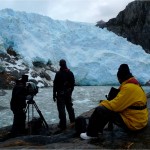 Cape Horn is globally known as a landmark for sailing and as the closest point of land to Antarctica, where hurricane force winds and torrential rains lash the coast year round. However, increasingly, thanks in part to the work of the Sub-Antarctic Biocultural Conservation Program (SABCP), it is becoming equally renowned for its diverse climates and ecosystems that create a unique combination of biological and cultural diversity.
Cape Horn is globally known as a landmark for sailing and as the closest point of land to Antarctica, where hurricane force winds and torrential rains lash the coast year round. However, increasingly, thanks in part to the work of the Sub-Antarctic Biocultural Conservation Program (SABCP), it is becoming equally renowned for its diverse climates and ecosystems that create a unique combination of biological and cultural diversity.
For these reasons, a co-produced series between the BBC (UK) and the Discovery Channel (USA) came to the Omora Park to film a program about the role of the sun in affecting weather patterns and in turn the role of weather in influencing ecosystems and biodiversity. Tentatively entitled 23 Degrees, referring to the Earth’s tilt off the sun’s axis, the series will feature three hour-long programs that range from the cold Canadian arctic to the dry Atacama Desert.
According to producer Charles Colville, the decision to film in the Cape Horn Biosphere Reserve was to look at “weather in the Southern Hemisphere during the austral summer, especially the effect of the very windy climate on the ecosystems in southern Patagonia and Tierra del Fuego…. and the effect of the climate on the development of the ecosystem, especially the ‘miniature forests’ [mosses, lichens and liverworts] that have evolved there.”
The team visited two principal areas. First, they filmed on La Bandera Mountain, showcasing the lichens and cushion plants that are adapted to the harsh conditions of wind, cold and UV in the high Andean zones of the Omora Park. Then, navigating aboard the Santa Maria Australis, the group visited the western portion of the archipelago, where Dr. Christopher Anderson, coordinator of the SABCP, emphasized the importance of the extremely wet conditions there in creating a “moss kingdom” in which tiny plants such as mosses and liverworts are not only diverse, but extremely abundant and even dominate the landscape.
Additionally, the show will discuss the importance of Cape Horn as a world priority research site for un-polluted and “virgin” forests, as the sub-Antarctic ecoregion has nearly no air or water pollution and experiences extremely low impacts from modern human society. Therefore, filming also included visits to remote glaciers along the Darwin Mountain Range of Tierra del Fuego Island.
According to Dr. Anderson, “for years the sub-Antarctic ecoregion has been overlooked by researchers, conservationists and even documentary film makers. Through the long-term socio-ecological research being pioneered at the Omora Park and in the Cape Horn Biosphere Reserve, we hope to not only revert those trends in research, but also make real contributions to social wellbeing in the far south by promoting sustainable activities such as ecotourism that take into account these unique ecosystems and species that make the archipelago special on a global level.
The series is set to air in February 2012 and will be hosted by Kate Humble, a highly regarded natural history television presenter for the BBC
For more information: http://www.bbc.co.uk/blogs/23degrees/. Photo source: Ben Finney/BBC/Discovery Channel
